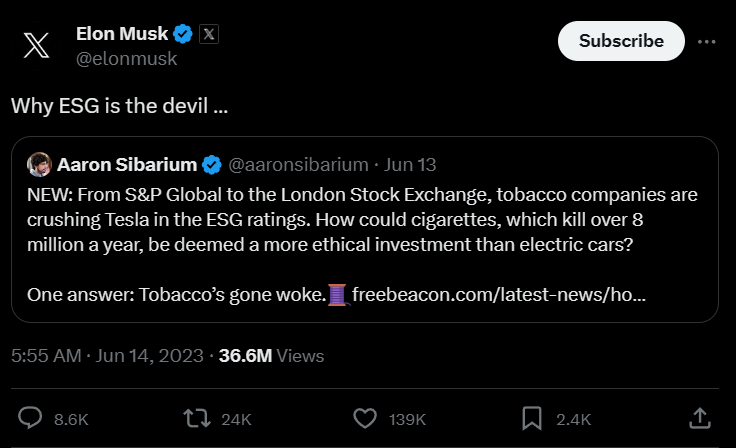Why Tesla's ESG Score Lags Behind Tobacco Firms!
Elon Musk Tweeted "Why ESG is the devil"

In the world of corporate evaluation, Environmental, Social, and Governance (ESG) scores stand as crucial measures for assessing a company's performance in sustainability and social responsibility. One might assume that Tesla, a trailblazer in electric vehicles and sustainable energy, would boast a high ESG score. However, the reality unveils a striking disparity when compared to unexpected counterparts, such as tobacco firms.
Tesla, an emblem of innovation in clean energy products, garnered an ESG score of 37 out of 100 from S&P Global, while Philip Morris International, a prominent tobacco company, received a significantly higher score of 84. This incongruity has prompted a vigorous debate regarding the credibility of ESG ratings in accurately portraying a company's societal and environmental impact.
The substantial difference between the scores of Tesla and Philip Morris has raised eyebrows and instigated discussions on various fronts. There are several potential reasons contributing to Tesla's lower ESG rating.
One major factor influencing Tesla's ESG score could be its use of cobalt, a mineral prevalent in the production of its batteries. The mining of cobalt is often associated with adverse environmental impacts and conditions detrimental to workers, an aspect that might be affecting Tesla's overall score.
Additionally, issues related to diversity and inclusion have surfaced within Tesla. In 2022, the company faced a lawsuit from the California Department of Fair Employment and Housing for alleged racial discrimination and harassment, which could be negatively influencing its ESG rating.
On the other hand, Philip Morris, in its pursuit to reduce environmental impact, has pledged to transition to a smoke-free model by 2030. This commitment, along with investments in alternative smoking products touted to be less harmful than traditional cigarettes, might contribute positively to the company's higher ESG rating.
However, it's essential to acknowledge the controversy around how ESG ratings are formulated and the criteria they consider. There's an ongoing discourse led by Elon Musk, Tesla's CEO, who has criticized ESG ratings, labeling them a "scam" and a tool weaponized by corporations.
Musk, in particular, has expressed dissatisfaction with the fact that tobacco companies—known for their detrimental health impacts—have higher ESG scores compared to innovative, environmentally focused companies like Tesla. His critique further ignites the ongoing debate surrounding the fairness and reliability of ESG ratings in investment decision-making.
Ultimately, the disparity in ESG scores between Tesla and Philip Morris underscores the complexity and potential subjectivity in assessing a company's societal and environmental impact. While ESG scores serve as a vital metric, they should be considered in conjunction with other factors when making investment decisions.
The case of Tesla's lower ESG score in comparison to tobacco firms like Philip Morris invites reflection on the criteria used, the nuances of impact evaluation, and the ongoing need for a comprehensive assessment framework that considers a wider spectrum of impacts and initiatives undertaken by companies.
In conclusion, while ESG ratings are significant tools for evaluating a company's sustainability and social responsibility, they are not without their shortcomings and controversies. The wide-ranging factors contributing to ESG scores highlight the intricacies involved in accurately gauging a company's societal and environmental impact.


